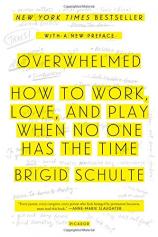Reading Group Guide
Discussion Questions
Overwhelmed: How to Work, Love, and Play When No One Has the Time

1. If you started keeping a time diary, what categories would you want to create? Would you follow John Robinson’s definition of leisure? Which category consumes most of your time right now?
2. In your family, how has the delegation of household duties changed over the generations? Did your childhood feature many scheduled activities, or did you have unstructured time? Did your parents embrace the idea of leisure and vacations?
3. How have you been affected by the increasing demands placed on salaried workers in an age of 24/7 availability? Who at your company would need to be convinced that reduced work hours and increased flexibility in scheduling could actually lead to increased productivity and profit?
4. How did you react to the author’s interviews with Pat Buchanan and other traditionalists? What sustains their point of view?
5. What would it take for programs such as the Menlo Innovations approach in Ann Arbor and the Alternative Work Schedule at the Pentagon to become the norm throughout the United States? What do the book’s progressive examples tell us about the best way to achieve change?
6. What are the most frequent contributors to your time confetti? If you could convert all of your confetti into leisure time, would you feel guilty?
7. Discuss the true equality proposed by Jessica DeGroot at ThirdPath Institute. Have you seen it in action in your community?
8. How would you respond to those who say women have only themselves to blame for the inequities they endure in the ratio of leisure time to “on call” time? What enabled Schulte to leave her kids behind and trust Tom? How did that help them work through their impasse?
9. What is at the root of discrimination against working moms, both in the workplace and among certain circles of stay-at-home moms? What do cases such as that of Renate Rivelli, the Brown Palace Hotel employee described in chapter 5, illustrate about the grossly inaccurate perceptions of a working mother’s capabilities?
10. How would you answer the central questions posed by Schulte in chapter 9: who’s right, what’s best, and how do we stop the insanity? What did you learn from her sojourn in Denmark, where work hours are shorter and highly focused while the economy remains robust? How could the concept of hygge help us redefine the ideal standard of living?
11. In your opinion, why does the ideal of the self-sacrificing mother persist, despite the gains of the feminist movement? Why have so many American families resisted the fact that dads also have a parenting instinct, and that a diverse caretaking community can have a highly positive impact on a child’s well-being?
12. One of the findings presented in OVERWHELMED is the notion that grit and self-confidence, rather than income or GPA, are strong predictors of happiness. What do our barometers of success say about our real values as a society? Is happiness --- whose pursuit is touted in the Declaration of Independence --- still valued in the United States?
13. Discuss the concept of contaminated time. Knowing that the brain’s working memory can hold only seven pieces of information at once, how would you begin to clear your cluttered mind --- even if the responsibilities of work and home seem to follow you 24/7? What kind of space would “decontamination” create in your life?
14. OVERWHELMED underscores the fact that years of history and cultural conditioning have spurred women to work harder than men, even during supposed time off: If a woman wants to watch TV, she’d better fold some laundry while she’s at it. If she’d like to read a book, she should do it on the treadmill. On family “vacations,” Mom will make sure that all of the kids’ needs are met. Does this ring true for you? Do the men and women in your world manage time differently? If so, what can they do to silence that little voice that says women don’t deserve to rest? What would motivate you to give yourself a break, even if it incites uproar at first?
15. Drawing on the author’s closing advice to “do one thing,” which of her changes will you implement in work, play, and love? What predictions would you make about the way future generations will balance their time among parenting, career, and leisure?
Overwhelmed: How to Work, Love, and Play When No One Has the Time
- Publication Date: March 3, 2015
- Genres: Family, Marriage, Nonfiction, Sociology
- Paperback: 368 pages
- Publisher: Picador
- ISBN-10: 1250062381
- ISBN-13: 9781250062383








